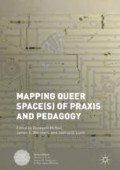Abstract
Mark McBeth and Tara Pauliny further the arguments in the preceding chapters, demonstrating that the disruption of traditionally academic spaces through queer thinking opens a space for “democratizing sensibilities” that allow students a greater sense of investment in equality and justice. McBeth and Pauliny ask, what if we proposed to our first-year composition students that they seem out of the ordinary (even extraordinary—yet not necessarily exceptional), all working within a space of shifting identities, and all, therefore, queer? Then, what if we then asked them to explore (rather than resist) this non-normative subjective position? The first year of college acts as a liminal space where students “leap forward—or linger at the door,” and freshmen often confront conundrums about their place in academia, their feelings of (dis)identification with intellectual labor, and a burgeoning sense of self that often feels “out of fashion” (Sommers and Saltz 133). For students, scrutinizing this liminal queerness allows their oft-disenfranchising feelings about school to become, instead, productive moments of learning. Using the triangulated frameworks of queer theory, performance studies, and composition/rhetoric research, McBeth and Pauliny provoke their students (and readers) to consider how their own non-normative positions have shaped their intellectual abilities, how these examined experiences can evoke interconnections with other people’s differences, and how these investigations can become an undertaking in identity deconstruction/reconstruction. They demonstrate how many of these discoveries occur in composition classrooms where students do not just absorb information from unilateral lectures but, instead, where they construct knowledge through self-generated, dynamic language that expands their boundaries of knowing (themselves). While incoming students often wrangle with ideas that they heretofore could not bear to know (Britzman), they can also gain a greater sense of the futurity of their own becoming (Halberstam; Muñoz). Ultimately, this study flirts with the idea that, when everyone considers their “queerness” in a personal yet socially grounded context, democratizing sensibilities may emerge through writing, and a greater investment in equality and justice may occur.
Access this chapter
Tax calculation will be finalised at checkout
Purchases are for personal use only
Notes
- 1.
This is not surprising since such a response can certainly be read as reasonable in the homosocial situation of a prison, where the definition of Queer needs to retain its sexual connotations precisely because inmates lose sexual autonomy when they enter this institution. It is also an understandable response since inmates often make situational sex choices, rely on stable gender roles for survival purposes, and behind bars, “Queer” takes on entirely new, and potentially precarious meanings. Queer, obviously in this scenario and others, demands rejection and cannot take on any democratic or collective meaning.
- 2.
This pedagogical metacognition or self-awareness may also remind faculty of how counter-intuitive and bizarre the habits of Academia can feel when first encountered. It seems that once enculturated into the habitudes of college, its members fall into Oddness Denial Syndrome (ODS), which apparently erases all memory of their once-novice, less masterful beginnings.
Works Cited
Ahmed, Sara. 2006. Queer Phenomenology: Orientations, Objects, Others. Durham: Duke University Press. Print.
Britzman, Deborah. 1998. Lost Subjects, Contested Objects. Albany: SUNY Press. Print.
Carroll, Lee Ann. 2002. Rehearsing New Roles: How College Students Develop as Writers. Urbana: CCCC/NCTE. Print.
Halberstam, Judith. 2005. In a Queer Time and Place: Transgender Bodies, Subcultural Lives. New York: New York University Press. Print.
Muñoz, José Esteban. 1999. Disidentifications: Queers of Color and the Performance of Politics. Minneapolis: University of Minnesota Press. Print.
Pratt, Mary Louise. 1991. Art of the Contact Zone. Profession 33–40. Print.
Sedgwick, Eve Kosofsky. 1993. Tendencies. Durham: Duke University Press. Print.
Silin, Jonathan G. 1995. Sex, Death, and the Education of Children: Our Passion for Ignorance in the Age of AIDS. New York: Teacher’s College Press. Print.
Sommers, Nancy, and Laura Saltz. 2004. The Novice as Expert: Writing the Freshman Year. CCC 56 (1): 124–149. Print.
Vygotsky, Lev. 1978. Mind in Society: The Development of Higher Psychological Processes. Cambridge, MA: Harvard University Press. Print.
Acknowledgment
Tara and Mark would like to thank the students in Mark’s Spring 2013 ENG 201 Honors course for their willingness to entertain these questions and for their insightful and thoughtful comments. This chapter could not have been written without them, and we hope we do justice to their ideas.
Author information
Authors and Affiliations
Editor information
Editors and Affiliations
Rights and permissions
Copyright information
© 2018 The Author(s)
About this chapter
Cite this chapter
McBeth, M., Pauliny, T. (2018). Queering the First-Year Composition Student (and Teacher): A Democratizing Endeavor. In: McNeil, E., Wermers, J., Lunn, J. (eds) Mapping Queer Space(s) of Praxis and Pedagogy. Queer Studies and Education. Palgrave Macmillan, Cham. https://doi.org/10.1007/978-3-319-64623-7_4
Download citation
DOI: https://doi.org/10.1007/978-3-319-64623-7_4
Published:
Publisher Name: Palgrave Macmillan, Cham
Print ISBN: 978-3-319-64622-0
Online ISBN: 978-3-319-64623-7
eBook Packages: EducationEducation (R0)

